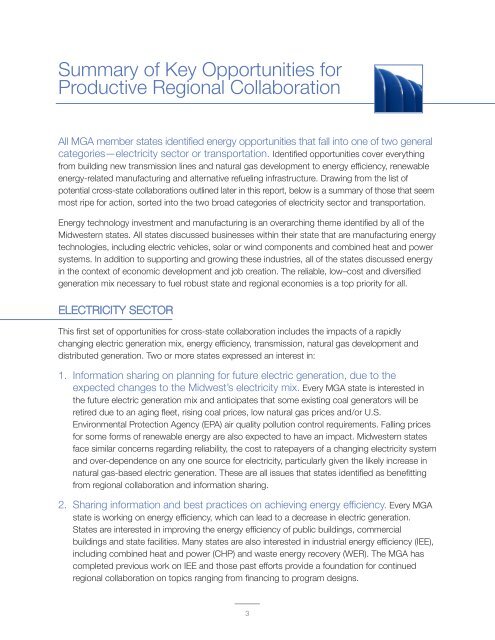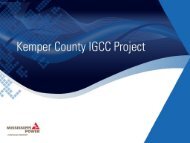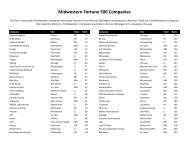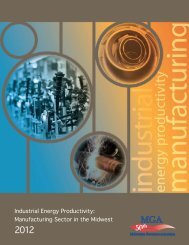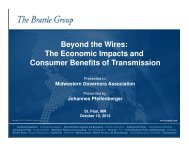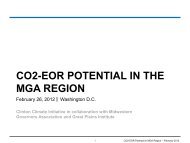Energy Action Paper - Midwestern Governors Association
Energy Action Paper - Midwestern Governors Association
Energy Action Paper - Midwestern Governors Association
You also want an ePaper? Increase the reach of your titles
YUMPU automatically turns print PDFs into web optimized ePapers that Google loves.
Summary of Key Opportunities for<br />
Productive Regional Collaboration<br />
All MGA member states identified energy opportunities that fall into one of two general<br />
categories—electricity sector or transportation. Identified opportunities cover everything<br />
from building new transmission lines and natural gas development to energy efficiency, renewable<br />
energy-related manufacturing and alternative refueling infrastructure. Drawing from the list of<br />
potential cross-state collaborations outlined later in this report, below is a summary of those that seem<br />
most ripe for action, sorted into the two broad categories of electricity sector and transportation.<br />
<strong>Energy</strong> technology investment and manufacturing is an overarching theme identified by all of the<br />
<strong>Midwestern</strong> states. All states discussed businesses within their state that are manufacturing energy<br />
technologies, including electric vehicles, solar or wind components and combined heat and power<br />
systems. In addition to supporting and growing these industries, all of the states discussed energy<br />
in the context of economic development and job creation. The reliable, low–cost and diversified<br />
generation mix necessary to fuel robust state and regional economies is a top priority for all.<br />
ELECTRICITY SECTOR<br />
This first set of opportunities for cross-state collaboration includes the impacts of a rapidly<br />
changing electric generation mix, energy efficiency, transmission, natural gas development and<br />
distributed generation. Two or more states expressed an interest in:<br />
1. Information sharing on planning for future electric generation, due to the<br />
expected changes to the Midwest’s electricity mix. Every MGA state is interested in<br />
the future electric generation mix and anticipates that some existing coal generators will be<br />
retired due to an aging fleet, rising coal prices, low natural gas prices and/or U.S.<br />
Environmental Protection Agency (EPA) air quality pollution control requirements. Falling prices<br />
for some forms of renewable energy are also expected to have an impact. <strong>Midwestern</strong> states<br />
face similar concerns regarding reliability, the cost to ratepayers of a changing electricity system<br />
and over-dependence on any one source for electricity, particularly given the likely increase in<br />
natural gas-based electric generation. These are all issues that states identified as benefitting<br />
from regional collaboration and information sharing.<br />
2. Sharing information and best practices on achieving energy efficiency. Every MGA<br />
state is working on energy efficiency, which can lead to a decrease in electric generation.<br />
States are interested in improving the energy efficiency of public buildings, commercial<br />
buildings and state facilities. Many states are also interested in industrial energy efficiency (IEE),<br />
including combined heat and power (CHP) and waste energy recovery (WER). The MGA has<br />
completed previous work on IEE and those past efforts provide a foundation for continued<br />
regional collaboration on topics ranging from financing to program designs.<br />
3


